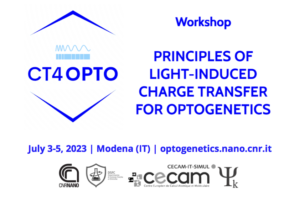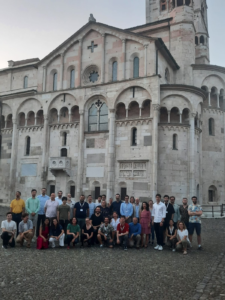 The Workshop “Principles of Light-Induced Charge Transfer for Optogenetics” was held in Modena (Italy) from July 3 to July 5, 2023 at Complesso San Geminiano (via San Geminiano 3), in the historical city center of Modena.
The Workshop “Principles of Light-Induced Charge Transfer for Optogenetics” was held in Modena (Italy) from July 3 to July 5, 2023 at Complesso San Geminiano (via San Geminiano 3), in the historical city center of Modena.
The event was organized by:
the Nanoscience Institute of the National Research Council of Italy – CNR Nano, the University of L’Aquila – Dipartimento di Scienze Fisiche e Chimiche (DSFC), the University of Southern California, and the Karlsruher Institut fur Technologie.
The event was sponsored by:
Psi-k, the Nanoscience Institute of the National Research Council of Italy, the University of L’Aquila – Dipartimento di Scienze Fisiche e Chimiche (DSFC) and Cecam-IT-Simul.
The aim of the workshop was to gather leading experts in the experimental and theoretical investigation of photoactive proteins that find application in the field of optogenetics. After the successful virtual edition of the same workshop in 2021, we organized a new, fully in presence, edition of the “Principles of light-induced charge transfer for optogenetics” workshop to emphasize new results and point out new directions, challenges and opportunities in the following fields:
- Charge transfer processes in light-sensitive proteins,
- Excited state properties of biological matter,
- Photoreceptor thermodynamics and photocycle kinetics,
- Interplay between photoexcitation and protein conformations.
These and other issues were faced from a chemical physical perspective, highlighting the main recent achievements in this timely and stimulating research field.
The workshop was attended by 41 participants (including 5 organizers): 12 were invited speakers and 19 were contributing speakers. A fee of € 150 has been requested to attend the workshop and cover part of the costs. The Scientific Committee gave the possibility to 4 students/young researchers participating with a contributed talk, to attend the workshop with waived fee. Selection of the four contributors that benefited from the waiver of the participation fee was made on the basis of the applicant’s CV and abstract.
The Scientific Committee awarded the “Best Oral Contribution Award“. The award recipient was selected under the following criteria: Excellence of the candidate and presentation; Relevance to the theme of the workshop; Juniority; Experimental/theoretical balance; Gender balance; Geographical balance. The award went to Giacomo Salvadori from University of Pisa.
Invited speakers list
- Jochen Blumberger | University College London
- James Boedicker| USC Dornsife
- Ksenia Bravaya | Boston University
- Samer Gozem | Georgia State University
- Ciro A. Guido | Università degli Studi del Piemonte Orientale
- Sharon Hammes-Schiffer | Yale University (remote participation)
- John Kennis | Vrije Universiteit Amsterdam
- Gloria Mazzone | Università della Calabria
- Massimo Olivucci | University of Siena & Bowling Green State University
- Nadia Rega | Università degli Studi di Napoli “Federico II”
- Igor Schapiro | The Hebrew University of Jerusalem
- Lyudmila Slipchenko | Purdue University
Detailed Program
Monday, July 3 – Session 1- Chair: Rosa Di Felice
14:30-15:00 Registration
15:00-15:15 Opening
15:15-16:00 Invited | Massimo Olivucci | University of Siena & Bowling Green State University “From Photon To Neuron: The Molecular Mechanism Of The Primary Event In Vision”
16:00-16:20 Katharina Spies | Karlsruhe Institute of Technology “Active Site Structure And Absorption Spectrum Of The Channelrhodopsin Chrimson – Wild Type And Mutants”
16:20-16:45 Coffee break
16:45-17:30 Invited | John Kennis | Vrije Universiteit Amsterdam “Isomeric Switching Near The Conical Intersection In Bestrhodopsin, An Unusual Red-Absorbing Microbial Rhodopsin”
17:30-17:50 Raffaella Polito | Sapienza University of Rome “Mid-IR Spectroscopy To Probe Conformational Changes Of Bacteriorhodopsin At The Nanoscale”
17:50-18:10 Maria Eleonora Temperini | Sapienza University of Rome “A New IR Spectroscopy Platform To Study The Effect Of Static Electric Fields On Biomolecules”
18:10-18:30 Thanh Nhut Do | Vrije Universiteit Amsterdam “Excitation-Fluence Dependent Two-Photon Induced Photoionization Of Bacterial Phytochrome”
Tuesday, July 4 – Session 2 – Chair: Isabella Daidone
09:00-09:45 Invited | Nadia Rega | University of Napoli Federico II & Scuola Superiore Meridionale “Photoinduced Charge Transfer Non-Equilibrium Processes: Theory And Modeling Strategies”
09:45-10:05 Daniele Narzi | University of L’Aquila “Mechanism Of The Light-Induced Water Oxidation Reaction Occurring In The Natural Oxygenic Photosynthesis”
10:05-10:25 Abhishek Sirohiwal | Stockholm University “Primary Events In Reaction Centre Of Photosystem II”
10:25-10:45 Coffee break
10:45-11:30 Invited | Ciro A. Guido | Università del Piemonte Orientale “Dispersion Interactions At The Excited State: Influence On Light-Responsive Properties Of Biosystems”
11:30-11:50 Sinjini Bhattacharjee | Max-Planck-Institut “Multiscale Modeling Of Genetic Variants Of Photosystem II”
11:50-12:35 Invited | Lyudmila Slipchenko | Purdue University “Triplet Energy Transfer In The Fenna-Matthews-Olson (FMO) Pigment-Protein Complex”
12:35-12:55 Pavel Rukin | CNR – Istituto Nanoscienze “Theoretical Study Of Vibrational-Mediated Interlayer Charge Transfer In A Cobalt Phthalocyanine-Graphene Heterojunction”
12:55-14:30 Lunch break
Tuesday, July 4 – Session 3 – Chair: Nadia Rega
14:30-15:15 Invited | Jochen Blumberger | University College London “Currents Of Bacterial Life Probed By Molecular Simulation And Pump-Probe Spectroscopy”
15:15-15:35 Matteo Capone | University of L’Aquila “Multiscale Modeling Of Photo-Induced Stereoselective Radical Cyclization In A Flavoenzyme”
15:35-15:55 Lorenzo Cupellini | University of Pisa “How Simulations Uncover The Photoactivation Mechanism Of Appa Bluf”
15:55-16:15 Coffee break
16:15-17:00 Invited | Sharon Hammes-Schiffer | Yale University “Nonequilibrium Excited State Dynamics Of Proton-Coupled Electron Transfer In Bluf Photoreceptor Proteins”
17:00-17:20 Laura Pedraza-Gonzales | University of Pisa “How The pH Controls Photoprotection In The Light-Harvesting Complex Of Mosses”
17:20-18:05 Invited | James Boedicker | USC Dornsife “Optogenetic Tools To Control Charge Transfer Within Bacteria”
18:05-18:30 Discussion
19:30-Social Dinner
Wednesday, July 5 – Session 4 – Chair: John Kennis
09:00-09:45 Invited | Gloria Mazzone | Università della Calabria “Light Induced Charge Transfer For Enhanced Photodynamic Therapy Action”
09:45-10:05 Colin Coane | University of Southern California “Unraveling The Mechanism Of Tip-Enhanced Molecular Energy Transfer”
10:05-10:25 Giovanni Parolin | University of Padova “Modelling Plexcitonic States With Single-Molecule Resolution”
10:25-10:45 Coffee break
10:45-11:30 Invited | Ksenia Bravaya | Boston University “Predictive Methods For Simulating Charge Transfer And Redox Processes In Proteins”
11:30-11:50 Davide Accomasso | University of Pisa “Uncovering A Carotenoid Quencher State In The CP29 Light-Harvesting Complex Of Plants”
11:50-12:10 Matteo Bruschi | University of Padova “Simulating Action-2D Electronic Spectroscopy From Molecular Dimers To Photosynthetic Antennas”
12:10-12:30 Stefano Scoditti | Università della Calabria “Unveiling The Photocatalytic Reduction Of Platinum(IV) Complexes By Riboflavin: Insights From Computational Analysis”
12:30-14:00 Lunch break
Wednesday, July 5 – Session 5 – Chair: Massimo Olivucci
14:00-14:45 Invited | Igor Schapiro | The Hebrew University of Jersualem “Insight Into The Photochemistry Of Cyanobacteriochromes By Qm/Mm Simulations”
14:45-15:05 Leonardo Barneschi | University of Siena “Mechanism Of Fluorescence Enhancement In Rhodopsin Optogenetic Reporters”
15:05-15:25 Giacomo Salvadori | University of Pisa “Transient Intermediates In A Bacteriophytochrome Photocycle Revealed By Multiscale Simulations”
15:25-15:45 Coffee break
15:45-16:05 Federico Gallina | University of Padova “Simulating 2D Spectroscopic Responses Of Optical Systems With Digital Quantum Computers”
16:05-16:50 Invited | Samer Gozem | Georgia State University “Electrostatic Tuning Maps And Average Protein Configurations: Tools To Aid In Studying Flavoproteins”
16:50-17:00 Closing
Organizers
The Scientific Committee of the CT4OPTO was composed by:
- Isabella Daidone | University of L’Aquila
- Rosa Di Felice | University of Southern California and CNR Nano Modena
- Marcus Elstner | Karlsruhe Institute of Technology
- Anna Krylov | University of Southern California
- Laura Zanetti Polzi | CNR Nano Modena
The Organizing Committee of the CT4OPTO was composed by:
- Maria Bartolacelli | CNR Nano Modena
- Susanna Cavicchioli | CNR Nano Modena
- Laura Zanetti Polzi | CNR Nano Modena
General remarks
During the whole workshop all participants showed a very high level of interest and keen participation. The discussion was always fruitful and lively, showing the high competence of the participants in the workshop topics. The invited speakers delivered very interesting and inspiring talks, but we were also impressed by the high quality of the contributed talks. During Q&As and the discussion sessions, very interesting inputs came from the audience. Overall, the whole workshop was characterized by a fruitful exchange of ideas that will surely motivate new research on the topic.
Conclusions and prospects
We believe that the workshop was an exciting and fruitful scientific event: the invited speakers presented very well their excellent research work and the contributed speakers delivered well-prepared and interesting talks. All these excellent contributions stimulated very interesting discussions which we hope will also serve as inputs for further developments in the field. Research on the topic has reached impressive levels, both from an experimental and from a theoretical point of view, and we also noticed that this is a very rapidly developing field. For this reason, we are already planning to organize the third edition of the workshop in two years.
Further details

